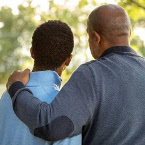 |
Children's Health
Helping Children Cope with School Shooting
By
May 26, 2022 - 11:44:31 AM
(HealthNewsDigest.com) - As the nation tries to comprehend the shooting at a school in Texas that claimed 21 lives, many are now trying to find ways to have conversations with their children to help them cope.
Listening to your child at this time is important, says Dr. Paul Croarkin, a Mayo Clinic child psychiatrist.
"Listening provides comfort, stability and safety for children," says Dr. Croarkin. All children have different communication styles. Initially, they may not want to discuss what happened but opportunities for listening may come later at unexpected times. It is best not to force or press children to discuss things until they are ready."
"Children often personalize things and may worry about friends or relatives near the event. Be creative and flexible in communicating with your child. Some children are more comfortable using art, toys, or writing for expression. Teenagers in particular often just want their parents around consistently without the pressure to communicate," Dr. Croarkin says. "Create structured time to simply be present and silent with an open door for communication."
Tragedies like this affect everyone. When it comes to talking to our children, it is normal to be nervous.
"This is completely normal and expected," says Dr. Croarkin. "Communicating with children, particularly in times of crisis with difficult topics, is never easy. Be kind to yourself and keep it simple in your communications. Let children be who they are and do your best to provide listening, honest communication, and support. Remember, no one is better qualified for communicating with your child than you."
Talking to your children about a tragedy can help them understand what happened, feel safe and begin to cope. Silence might make the event seem more threatening to your children.
If possible, choose a time when your children are likely to want to talk, such as before dinner. Ask your children what they already know and what questions or concerns they have. Let your children's answers guide your discussion.
When talking to preschool children, get down to their eye level. Speak in a calm voice using words they will understand. Explain what happened and that you will keep caring for them. For older children, use gentle words and offer comfort. Encourage them to share any worries.
Consider your children's age when sharing details. Listen to your children for misinformation, misconceptions and underlying fears. Provide accurate information.
Your children might experience fear, shock, anger, anxiety and grief. Your children's age will affect how they handle the stress of a tragedy.
For example:
These reactions are normal. However, if your children continue to display these behaviors for more than two to four weeks, they might need more help coping. If you're concerned about your children's reaction, talk to a mental health professional.
To help your children process what happened:
Caring for yourself after a tragedy is important. Pay attention to your feelings and lean on loved ones or talk to a mental health professional. Get enough sleep, eat a healthy diet and stay active. This will enable you to care for your children and be a role model for how to cope.